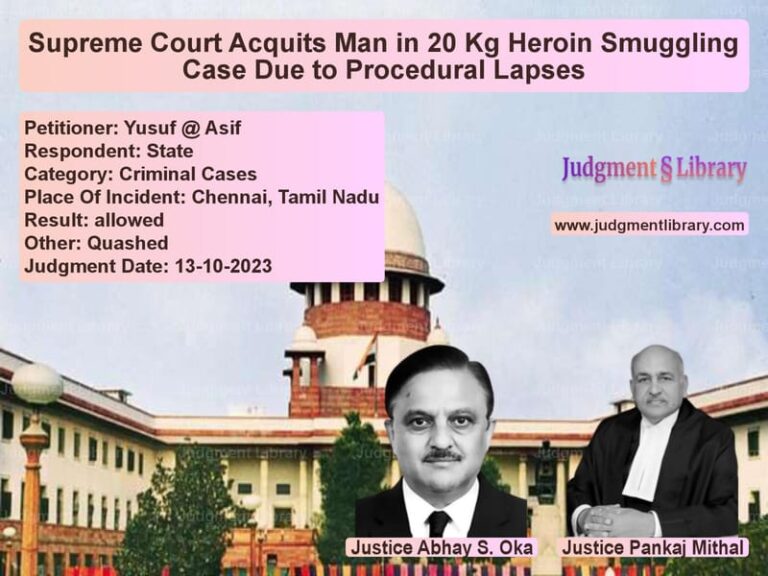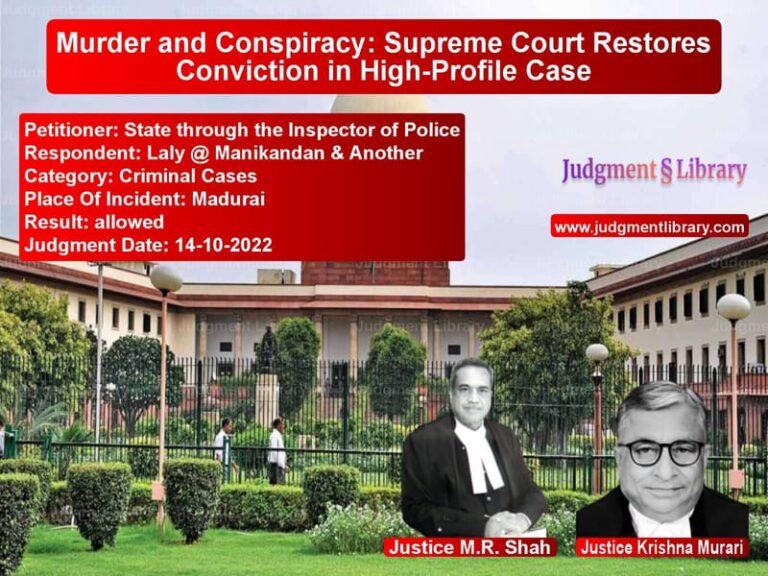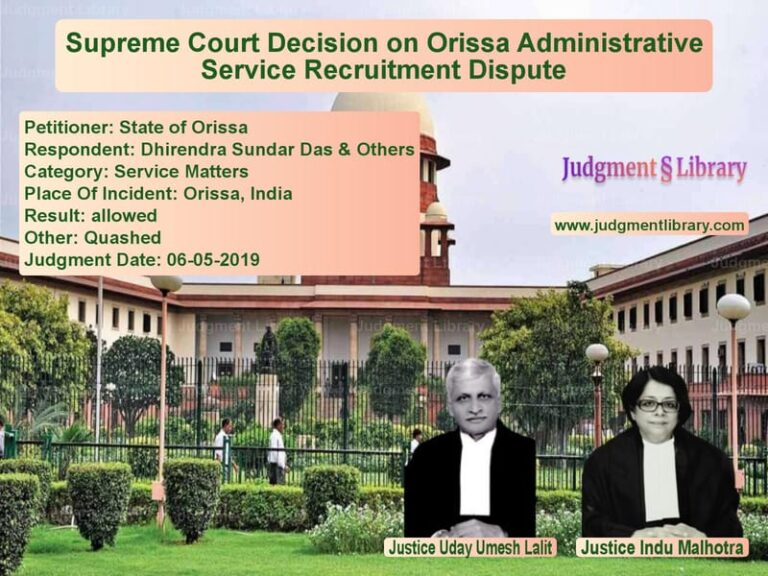Supreme Court Orders Reforms to Address Overcrowding and Poor Conditions in Indian Prisons
The case of Re: Inhuman Conditions in 1382 Prisons is a significant ruling by the Supreme Court of India, addressing serious concerns about overcrowding, understaffing, and inadequate facilities in prisons across the country. This case was taken up as a Public Interest Litigation (PIL) to ensure that the rights of undertrial prisoners and convicts were protected and that the conditions in jails were improved.
Background of the Case
The Supreme Court initiated proceedings after reviewing reports highlighting the inhuman conditions in Indian prisons. The petition was filed in 2013, bringing attention to the overcrowding of prisons, lack of staff, poor treatment of women prisoners and their children, and delays in trials. The Court considered various reports and recommendations from the National Legal Services Authority (NALSA) and the Bureau of Police Research and Development (BPRD).
During the proceedings, six major issues were identified for immediate action:
- Functioning of Under Trial Review Committees (UTRCs)
- Overcrowding in prisons
- Vacancies in prison staff
- Conditions of women prisoners and their children
- Need for proper training manuals for prison officers
- Implementation and expansion of open prisons
Arguments by the Petitioners
The petitioners, represented by amicus curiae, argued that:
- Overcrowding in prisons exceeded 150% in many jails: This violated basic human rights and led to poor sanitation and health issues.
- Undertrial prisoners were languishing in jail for years: Many prisoners were detained longer than their potential sentences due to delayed trials.
- Women prisoners faced discrimination: Pregnant women and children born in prisons were not provided proper care.
- Staff shortages affected prison management: Many prisons had severe staffing shortages, affecting security and administration.
Arguments by the Respondents (Union of India & State Governments)
The Union of India and various state governments presented their responses:
- The government had already started reforms under NALSA and BPRD to address prison conditions.
- Efforts were underway to fill vacancies in prison staff, but recruitment processes took time.
- The Ministry of Women and Child Development was conducting a study on the conditions of women prisoners and would take necessary action.
- The Bureau of Police Research and Development had prepared training manuals for prison staff.
- Steps were being taken to encourage the establishment of open prisons, with new rules being drafted.
Supreme Court’s Observations
The Supreme Court, led by Justice Madan B. Lokur and Justice Deepak Gupta, made the following key observations:
1. Under Trial Review Committees (UTRCs)
The Court noted that the Standard Operating Procedure (SOP) for UTRCs was ready and directed that:
- It should be finalized by June 30, 2018.
- All District Judges and UTRCs should be instructed to implement it.
- If any issues arose in implementation, they should be reported to NALSA for corrective action.
“We compliment Mr. Rathi and others in NALSA associated in the drafting of the SOP and place on record our appreciation for their efforts.”
2. Overcrowding in Prisons
The Court expressed serious concern over overcrowding and directed all High Courts to take action:
- Each High Court was asked to initiate suo moto proceedings on overcrowding.
- The Chief Justices of all High Courts were instructed to address the matter with the assistance of State Legal Services Authorities.
- The Secretary General of the Supreme Court was directed to circulate this order to all High Courts.
3. Vacancies in Prison Staff
The Court noted the severe understaffing in prisons and directed:
- Each High Court should take up recruitment issues as a separate suo moto writ petition.
- State governments should prioritize filling vacant positions.
- The Supreme Court would review progress periodically.
4. Women Prisoners and Their Children
The Ministry of Women and Child Development was already conducting a study on women prisoners, and the Court directed:
- The study should be completed by June 30, 2018.
- The ministry should submit its recommendations within two to three weeks after the study.
- The matter would be reviewed on August 2, 2018.
5. Training Manuals for Prison Officers
The Bureau of Police Research and Development had prepared training manuals, and the Court directed:
- National and state police academies should incorporate these manuals in training programs.
- The BPRD should update the manuals as needed and inform the amicus curiae.
6. Open Prisons
The Court emphasized the importance of open prisons as a reformative measure and ruled:
- The Model Rules for Open Prisons should be circulated to all states for notification and implementation.
- Existing open prisons should be fully utilized, and states should consider expanding them.
- The matter would be reviewed on August 2, 2018.
Final Judgment
The Supreme Court ordered:
- High Courts must initiate suo moto cases on overcrowding and staff vacancies.
- UTRC guidelines should be implemented across all districts.
- State governments must prioritize prison staffing, training, and open prisons.
The Court concluded:
“We expect that necessary steps will be taken by the State Governments to notify and implement these Rules faithfully and sincerely.”
Impact of the Judgment
This ruling is a landmark step in prison reforms in India. Its key implications include:
- Strengthening Legal Oversight: By involving High Courts in monitoring prison conditions, the ruling ensures better accountability.
- Improving Prison Conditions: The directives aim to reduce overcrowding, increase staff, and provide better care for women and children.
- Encouraging Open Prisons: The judgment promotes reformative justice by encouraging open prisons.
This ruling underscores the Supreme Court’s commitment to protecting prisoners’ rights and ensuring humane conditions in jails across India.
Petitioner Name: Re-Inhuman Conditions in 1382 Prisons.Respondent Name: Union of India & Others.Judgment By: Justice Madan B. Lokur, Justice Deepak Gupta.Place Of Incident: India (Prison System).Judgment Date: 08-05-2018.
Don’t miss out on the full details! Download the complete judgment in PDF format below and gain valuable insights instantly!
Download Judgment: Re-Inhuman Condition vs Union of India & Oth Supreme Court of India Judgment Dated 08-05-2018.pdf
Direct Downlaod Judgment: Direct downlaod this Judgment
See all petitions in Fundamental Rights
See all petitions in Public Interest Litigation
See all petitions in Separation of Powers
See all petitions in Judgment by Madan B. Lokur
See all petitions in Judgment by Deepak Gupta
See all petitions in partially allowed
See all petitions in Remanded
See all petitions in supreme court of India judgments May 2018
See all petitions in 2018 judgments
See all posts in Constitutional Cases Category
See all allowed petitions in Constitutional Cases Category
See all Dismissed petitions in Constitutional Cases Category
See all partially allowed petitions in Constitutional Cases Category







